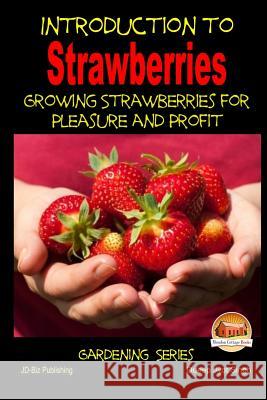Introduction to Strawberries - Growing Strawberries for Pleasure and Profit » książka
Introduction to Strawberries - Growing Strawberries for Pleasure and Profit
ISBN-13: 9781507795361 / Angielski / Miękka / 2015 / 46 str.
Introduction to Strawberries - Growing Strawberries for Pleasure and Profit
ISBN-13: 9781507795361 / Angielski / Miękka / 2015 / 46 str.
(netto: 26,57 VAT: 5%)
Najniższa cena z 30 dni: 27,83
ok. 16-18 dni roboczych
Dostawa w 2026 r.
Darmowa dostawa!
Table of Contents Introduction Planting Strawberries Straw and Sedge Peat Mulch Selecting the Right Plants Feeding Your Plants Protecting Your Strawberries Strawberry Pests and Diseases Aphids - Fungi and Viruses - Soil pests - Popular Strawberry Varieties Remontant Strawberries Climbing Strawberries - Innovative Ways of Growing Strawberries Polythene Covered Frames Traditional Gardening Soil Mix The Best Organic Fertilizer/Compost Base Conclusion Author Bio Publisher Introduction Nobody knows when the attractive Woodland plant known to the world as strawberries decided to leave the edges of the wood lands and invade the gardens of human beings. But one is grateful that this is one plant which was allowed to grow and flourish in the gardens, instead of being considered to be just another weed, which had this habit of taking over large coppices, which were rich in natural humus. This very popular fruit, cultivated globally is now known as the garden or just a strawberry. It belongs to the Fragaria genus of plants, which is made up of other fruits which are not berries, but are a number of aggregate fruits. Thanks to its very attractive red and bright color, strawberry aroma, sweetness and juicy flavor, is it a surprise that there is no fruit like the strawberry for adding style and distinction to your garden patch. Just imagine ice creams, fruit juice, milkshakes, chocolates and pies, which have not been flavored with the delicate flavor of a strawberry. In fact artificially produced strawberry flavors are used extensively in lip glosses, lip balms and other beauty products. Strawberries, especially the Woodland strawberries are supposed to have originated in Europe, because references to these sweet delicious berries have been found in ancient Roman classical cuisine. They were also used by the Romans to cure a number of ailments related to the skin. Crushed strawberries were placed under ashes and skin problems in order to clear and cure the skin ailment and to make it smooth and glowing again. The plant was also used to treat depression. Strawberry growers of the early Victorian days used to take a great delight in digging up large coppices in the wood lands. These lands were rich in natural fertilizer, especially organic fertilizer, humus, and a well fertilized soil too. These lands were then allowed to be overrun with strawberries. When people got to know in the medieval ages that all you had to do was go into the woods, cut some strawberry runners and plant them in your plot of land, and they would grow and bear fruit, this fruit began to be more and more popular both with gardeners and with farmers.
Zawartość książki może nie spełniać oczekiwań – reklamacje nie obejmują treści, która mogła nie być redakcyjnie ani merytorycznie opracowana.











